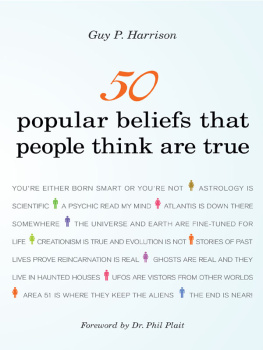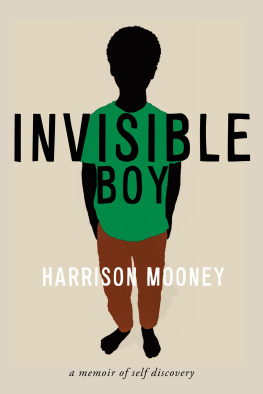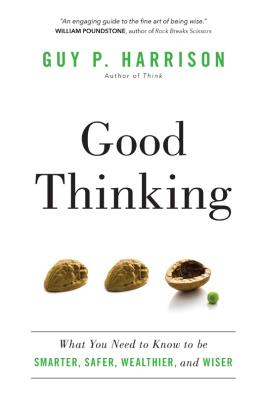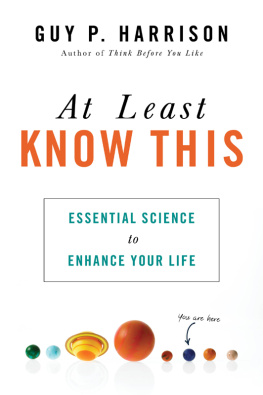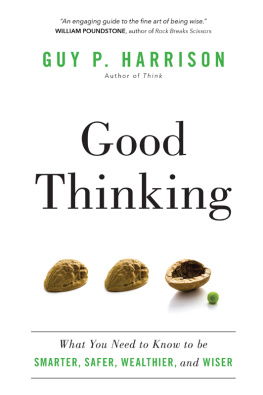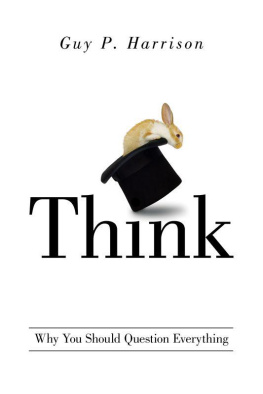Praise for Race and Reality:
What Everyone Should Know about Our Biological Diversity
This is a very important, profound, enjoyable, and enlightening book. It should go a long way in helping disprove man's most dangerous myth.
Robert W. Sussman, professor of anthropology, Washington University,
editor of Yearbook of Physical Anthropology, and
editor emeritus of American Anthropologist
A tour de force that conveys the current science on racial classification in a rigorous yet readable way. A book so clearly written, so elegantly crafted, so packed with nuggets that even those who think they know it all about race and racial classification will come away changed.
David B. Grusky, professor of sociology,
director of the Center for the Study of Poverty and Inequality,
Stanford University
Guy P. Harrison's well-written and passionate plea for eliminating the idea and ideology of race should be widely read. He has shown that the idea of race not only is contradicted by science but [also] is a social anachronism that should not be tolerated by society in the twenty-first century.
Audrey Smedley, professor emerita,
Anthropology and African American Studies,
Virginia Commonwealth University

Praise for 50 Reasons People Give for Believing in a God
Deep wisdom and patient explanations fill this excellent book.
James A. Haught, editor of West Virginia's largest newspaper,
Charleston Gazette
Engaging and enlightening.Read this book to explore the many and diverse reasons for belief.
Michael Shermer, publisher of Skeptic
A persuasive and frequently humorous book about an important topic.[S]hould be read by religious practitioners, political leaders, and the general public.
Nick Wynne, PhD, executive director of the Florida Historical Society
[D]oesn't bully or condescend. Reading Harrison's book is like having an amiable chat with a wise old friend.
Cameron M. Smith and Charles Sullivan,
authors of The Top 10 Myths about Evolution

Visit Guy's website at www.guypharrison.com
Contact him at

Published 2012 by Prometheus Books
50 Popular Beliefs That People Think Are True. Copyright 2012 by Guy P. Harrison. Illustrations by Kevin Hand. All rights reserved. No part of this publication may be reproduced, stored in a retrieval system, or transmitted in any form or by any means, digital, electronic, mechanical, photocopying, recording, or otherwise, or conveyed via the Internet or a website without prior written permission of the publisher, except in the case of brief quotations embodied in critical articles and reviews.
Trademarks: In an effort to acknowledge trademarked names of products mentioned in this work, we have placed or after the product name in the first instance of its use in each chapter. Subsequent mentions of the name within a given chapter appear without the symbol.
Cover design by Nicole Sommer-Lecht
Inquiries should be addressed to
Prometheus Books
59 John Glenn Drive
Amherst, New York 142282119
VOICE: 7166910133
FAX: 7166910137
WWW.PROMETHEUSBOOKS.COM
16 15 14 13 12 5 4 3 2 1
Library of Congress Cataloging-in-Publication Data
Harrison, Guy P.
50 popular beliefs that people think are true / by Guy P. Harrison; illustrations by Kevin Hand.
p. cm.
Includes bibliographical references and index.
ISBN 9781616144951 (paper : acid-free paper)
ISBN 9781616144968 (ebook)
1. Common fallacies. 2. HistoryErrors, inventions, etc. 3. Belief and doubtMiscellanea. 4. Popular cultureMiscellanea. I. Title. II. Title: Fifty popular beliefs that people think are true.
AZ999.H37 2011
149'.73dc23
2011032747
Printed in the United States of America on acid-free paper


I am grateful to the following for their invaluable help in producing this book: Kevin Hand, Frank Ward, Neil deGrasse Tyson, Michael Shermer, Ian Birnbaum, Paul A. Offit, Steven L. Mitchell, Tariq Moosa, Benjamin Bradford, Sheree Harrison, Seth Shostak, Andrew Chaikin, Cameron M. Smith, Brian Dunning, Lewis Nick Wynne, Justin Uzell, Jefferson Fish, Coni Harrison, Andrea Roach, Victor Stenger, Hank Davis, Michelle Mead, Mark Gunner Lewis, Nancy White, Shawn Browning, Curtis Wienker, Kenneth Feder, Phil Plait, and Cayman Free Press.

Dr. Phil Plait
N o one is born a skeptic.
Kids are natural scientists, though. They love to soak up knowledge, explore, experiment, name things (I can still remember my very young daughter, all those years ago, asking me to name the stars in the sky, one after another).
I suppose not all that is really science, though. Memorization and categorization are important, and the foundation of being able to understand relationships between objects, but they're not science. The basic property that makes science science is that it's self-checking. You don't just make an assumption; you test it. You see if it works the next time you use it. And you don't assume that just because it did, it always will.
And the most important thing, the one aspect of science that sets it apart from all other methods of knowing, is that science isn't loyal. You can rely on an idea for years, decades, but if something comes along that proves the idea wrong, boom! It gets chucked out like moldy cheese.
Well, not always. The other thing about science is that it builds on previous knowledge. If you learn something works pretty well, and then something else comes along that does better, a lot of the time you find out the second thing is just a modification of the first. Einstein didn't trash Newton; relativity updated Newton's mechanics, made it work better when objects are traveling near the speed of light, or where there's lots of gravity.
It was the accumulation of knowledge, of fact, that modified Newton's ideas. Hard-won, too, with experiments that contradicted centuries of common wisdom. But that knowledge, when it's correct, builds over time. It all has to work, like a tapestry. And it does.
Still, it's hard to let go of an idea even when you know it's wrong. Sometimes the idea is stubborn (or its holder is). Sometimes it's comforting to have a warm, fuzzy idea. I bet that most of the time, though, it's ego, pure and simple. We identify with the ideas we keep, and if that idea is wrong, then that means some part of us is wrong. That's a difficult issue to deal with.
And that's why kids can be natural-born scientists, but terrible skeptics. And that's OK; sometimes kids need to just do stuff because I said so, and you don't want them always questioning you. The real problem comes when they grow up and don't let go of that characteristic.
We all do it. Believing is easy. Being skeptical is hard. It's the road less traveled, rough-hewn and difficult. There are pitfalls everywhere, scary dark places, things that would be so much easier just to wish away when we close our eyes.

